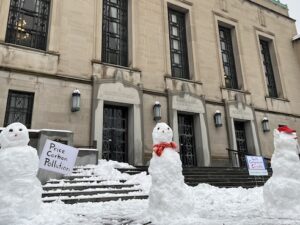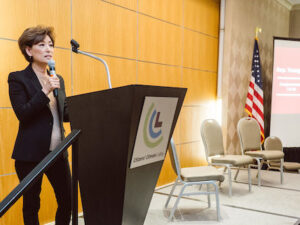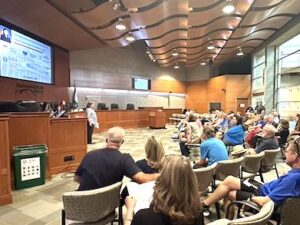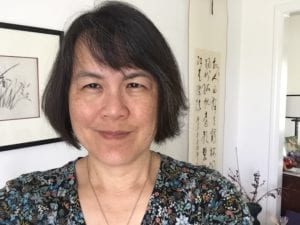
Members of U-M CCL. From left: Michael Gapuz, Eli Levine, Sabrina Butcher, Catherine Garton, Gabe Linderman, Lena Swirczek, Marc Jaruzel, Lydia Plescher, Jacob Bone, Tim Dalrymple
CCL chapter at University of Michigan helps bridge party divides
By Mary Gable
When a group of students at the University of Michigan (U-M) decided to form a new Citizens’ Climate Lobby (CCL) chapter on campus, they did so to address a few needs unique to university settings. For example, they decided to meet on weeknights, so as not to conflict with Saturday football games and other activities. They’d need to work within the academic calendar, meaning taking a recess during the summer months and avoiding scheduling events during midterms or finals. They would also need to accommodate frequent member and leader turnover, as students graduated and spent semesters away from campus.
At the same time, college-based chapters like the one at U-M may have a leg up on new chapters based in cities or communities. They have a clearly defined—and geographically limited—audience of potential members, and plenty of opportunities to reach them at events like student activities fairs. Like most college students, U-M students are willing to dedicate time to new skills and interests (and what undergrad doesn’t understand the value of another extracurricular on their resume?). Perhaps most importantly, most undergraduate students today are members of Generation Z, a cohort that has demonstrated its ability to mobilize in service of climate action, as recent school walkouts, protests and legal actions have shown. By definition, the climate crisis will most affect younger generations of Americans, so it’s no surprise that they are coming of age prepared to fight back.
Making connections on campus
The U-M chapter of CCL launched in the summer of 2018. Timothy Dalrymple, then a sophomore, joined the chapter that fall and was appointed treasurer. One of his first priorities was simply to help the group make a name for itself on campus. “I started by emailing anyone who I thought might be interested in CCL’s work, like the leaders of other environmental groups, political groups, and public policy clubs,” Dalrymple explains. “I offered to give presentations to their members on who we are and what we do.”
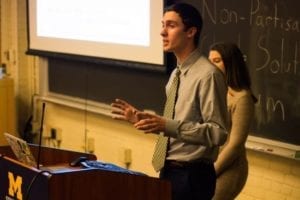
Tim Dalrymple and Lena Swirczek give a presentation
The College Republicans group on campus accepted the offer. “Members of the College Republicans feel strongly about addressing climate change, and they were interested in becoming part of the conversation about possible solutions,” Dalrymple says. The vice president of the club suggested that they work together to organize a joint caucus on carbon fee and dividend policy. The two groups, along with U-M’s Climate Action Movement, planned the event for the spring semester. (Climate Action Movement is working to ensure that the university makes good on its commitment to carbon neutrality, which U-M President Mark Schlissel announced in late 2018.)
During the event, Dalrymple and U-M CCL co-president Lena Swirczek presented CCL’s proposal, then opened up the floor for questions and discussion. Despite the differing political affiliations of those at the event, the forum was well received. “The tone of the discussion was inquisitive and respectful,” Swirczek reports. “People had lots of questions about the dividend component of the bill, and overall were interested to hear about a climate change solution that many of them hadn’t been exposed to before.”
Welcoming everyone into the conversation
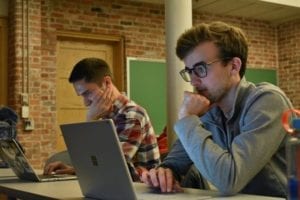
Sean Clark (front) and Tim Dalrymple
Members of U-M CCL have taken other actions during the chapter’s brief tenure, from participating in a meeting with their member of Congress, Rep. Debbie Dingell, and attending regional and national CCL conferences. The group is taking a pause for the summer, but has plans to hit the ground running when the fall semester begins next month. Its recruiting work will begin at Festifall, U-M’s annual fair for student organizations, which attracts more than 5,000 students each year, and EarthFest, a festival focused on sustainability on campus. The chapter will also plan a follow-up to the spring’s carbon pricing forum, and potentially other events with fellow student organizations.
Above all, U-M CCL will continue its inclusive approach, welcoming Wolverines of all political leanings who are interested in meaningful dialogue about climate solutions. “As a student organization, we believe that engaging all students in discussions about something as important as climate change is paramount,” Dalrymple says. “Climate change is not a liberal issue or a conservative issue. It’s a global issue. There’s only one way to tackle this crisis, and that’s together.”

